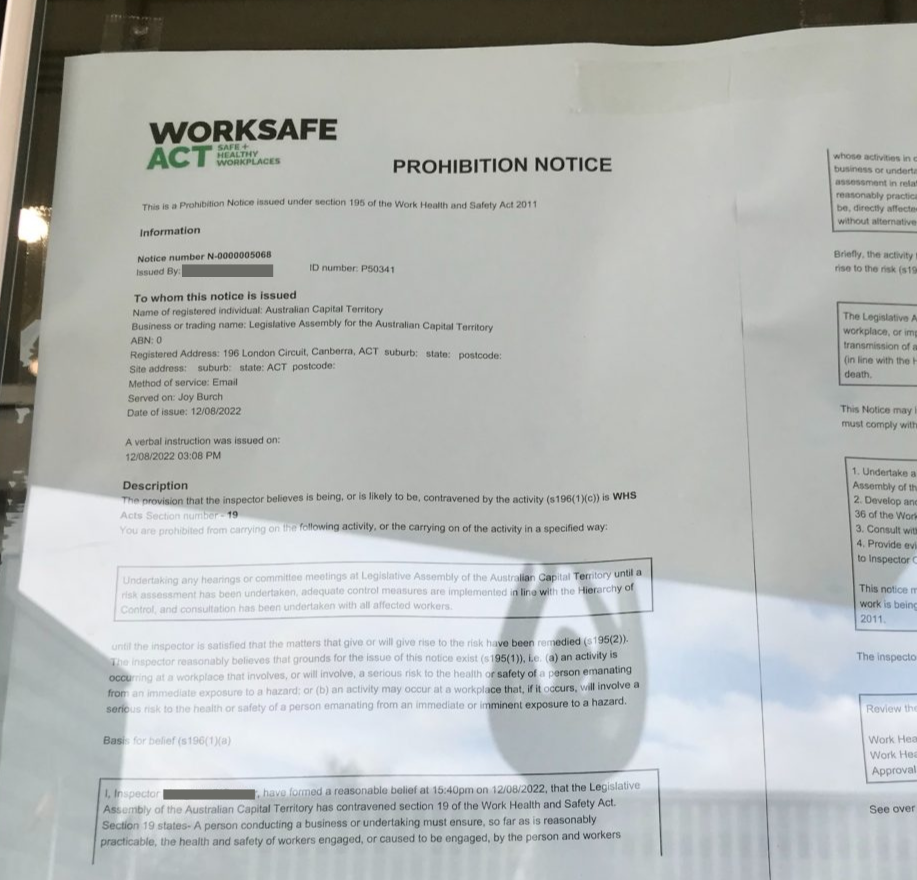
The now infamous Prohibition Notice that scuppered estimates hearings earlier this year. Photo: Lottie Twyford.
It was just a piece of paper stuck to the doors of the ACT Legislative Assembly. But that piece of paper threw a spanner in the works of this year’s estimates hearings and managed to become a constitutional stoush.
Now, a top legal team has advised inspectors from the Territory’s work safety watchdog did not have the power to issue that infamous prohibition notice in August.
That position has been supported by the Office of the Legislative Assembly Acting Clerk Julia Agostino, who said in her submission there was “every likelihood” it would be beyond the power of WorkSafe ACT to put s stop to the proceedings of an Assembly committee.
She also questioned whether the notices had been issued appropriately on the Speaker as she does not have power over committee activities and whether an improvement notice could have been issued instead.
Lawyers Bret Walker SC and Jackson Wherett said in a joint opinion they could not rule whether or not the issuing of the notice amounted to a breach of parliamentary privileges.
Mr Walker has acted in high-profile cases like the appeal of Cardinal George Pell and the inquiry into the Ruby Princess.
They said only members of parliament could make a call on the question of privileges.
“If the notices were not validly issued, the inspector would have purported to interfere with the workings of the Assembly without any statutory authority to do so … in our opinion, it would be open to the Select Committee to conclude that the issuing of the prohibition notices amounted to a breach of parliamentary privilege,” Walker and Wherett wrote.
In the Westminster system, courts and government agencies cannot generally interfere with parliamentary activities because of these so-called privileges, which essentially exempt parliamentarians from laws if those laws would stop them from doing their jobs.
The lawyers also questioned whether the Assembly could actually be defined as a workplace under the Work Health and Safety Act.

Speaker Joy Burch has questioned the validity of WorkSafe ACT stopping the estimates process from going ahead as planned. Photo: Region.
Assembly Speaker Joy Burch had previously expressed concerns the actions of WorkSafe ACT stopped estimates from going ahead and therefore could amount to a breach of privileges.
As a reminder, the ACT’s work safety watchdog slapped a Prohibition Notice on this year’s Select Committee on Estimates after one of its inspectors failed to find evidence of a COVID-19 risk assessment for those hearings.
However, the Legislative Assembly itself did have a COVID-19 safety plan in place.
The estimates process allows the budget to be scrutinised over a couple of weeks by non-executive members of the government and the Opposition.
Workplace Safety Minister Mick Gentleman has been accused of using his position to “influence, suggest or pressure” the regulator into issuing the notice.
That assertion was made by the select committee on estimates, comprising Canberra Liberals chair James Milligan, Labor’s Dr Marisa Paterson and the Greens’ Andrew Braddock.
It also slammed Mr Gentleman for failing to engage in a genuine consultation process before the issuing of the notice and him seeking advice from WorkSafe ACT.
Mr Gentleman has already hit back at these claims.
“The assertion from the Estimates Committee is wrong and there is no evidence to support it because it doesn’t exist,” he said in a statement.
The committee has also accused the ACT’s Work Health and Safety Commissioner Jacqueline Agius of having “improper[ly]” interfered with the work of the committee.
Before issuing the notice, there had been some disagreement between Mr Gentleman and the committee over how estimates should take place.
The work safety minister wanted witnesses to choose whether to attend in person or appear virtually, and he repeatedly wrote to the committee to urge this.
The committee had decided its preference was for “in-person hearings wherever possible, within COVID-safe parameters”. It confirmed that online attendance would have been available and social distancing, room limits and other COVID-safe measures would have been in place.
Following the episode, the Assembly voted to create a committee to investigate exactly what had gone on.
That committee will hold its first public hearings on 24 and 25 October.













